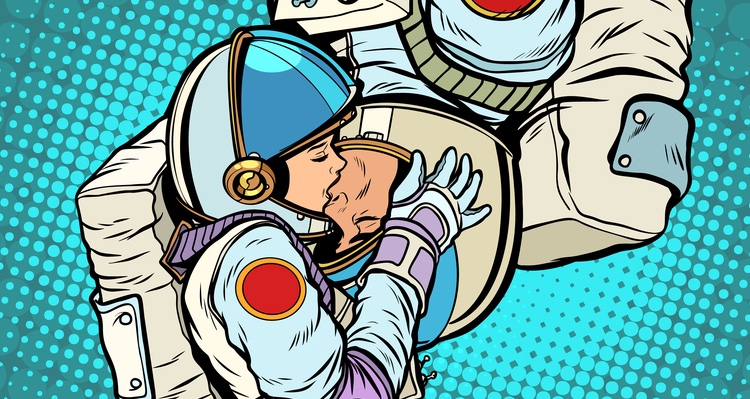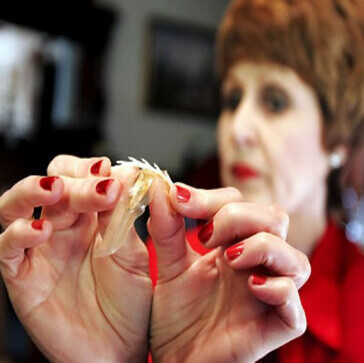Out Of This World: When Will Space Sex Finally Lift Off?
For humanity’s sake it should be a question of not if but when

On the Scientific American Science, Quickly podcast, Kinsey Institute research psychologist Simon Dubé and Shawna Pandya from the International Institute for Astronautical Sciences shared their thoughts on what may have kept researchers from exploring the pros and cons of sex in space.
Something Dubé and Pandya point out is essential to understand if humanity ever hopes to travel to other worlds—and the stars beyond.
A Disney approach
“I think there must have been this rumor floating around NASA for the longest time,” Pandya said when asked why investigating the possible effects of spaceflight on human sexuality is never even discussed, “that if they discussed sex in space, they would go blind or something like that—because, historically speaking, NASA very much took a Disney approach.”
Adding, “There’s stories of proposed research that was quashed, careers that were ruined, because it wasn’t deemed a priority, and it was deemed to be actually quite salacious.”
Thanks for all the fish
Agreeing on the issue is due to space exploration being primarily a governmental and/or military purview, Dubé notes. Technically, space sex has already occurred- albeit with medaka fish aboard the 1994 Columbia space shuttle.
RECOMMENDED READ: Why Do We Need to Research Sex in Space?
As for urban legends of certain astronauts engaging in freefall sexual activities, as far as anyone knows, it never happened.
“Mark Lee and Jan Davis,” Dubé mentions the most common candidates with the caveat that, “I think I would be hearing from lawyers if I put forth that rumor that it was humans,” then clarifying that sex in space, to date, has so far been limited to those Japanese fish.
Not want, but need to understand
Dubéand Pandya equally advocates the necessity of studying off-world human sexuality and reproductive biology; as Pandya said, though some work has been done, there’s a lot left to understand “because in some cases, gravitational exposure causes, interferes with neurodevelopment, and we observe challenges with development even in mammals, in mice and rats.”
She continues, “In other cases, that is transient. In certain cases, there is a higher rate of offspring death, so we saw that in one of the Biosatellite experiments when wasps were flown to space.”
Dubé believes we should expand our research further, as in “Gynecology, reproductive health, population diversity, having children, raising children, evolution, sexual rights, sexual rights, including pleasure and intersectionality, social justice issue, our sexual responses and behavior.”
A question of logistics
When it comes to actually doing it in freefall, Pandya and Dubé say it may take some getting used to—particularly as Newton’s Third Law might require amorous astronauts to rethink many of our terrestrial love-making basics or risk potentially painfully bouncing around their spacecraft.
On the subject, Pandya put forth Vanna Bonta’s 2suit, which, by holding our couple together, might help prevent such accidental collisions. Inspired by dolphins, astronaut Walter Ulrich proposed the introduction of a third person. As Pandya suggested, “Why doesn’t an astronaut take one for the team so they can all do it dolphin-style in the name of the greater good, so we can copulate in space.”
Ironically, achiving and maintaining an erection in freefall may not turn out to be an issue. In astronaut Mike Mullane’s book, Riding Rockets, he writes that—for him at least—it acted like space viagra.
Adding my own thoughts, new volumes of the Kama Sutra might have to be written, packed with positions, or perhaps involving a range of specifically designed and engineered pleasure devices based on microgravity physics.
Maybe one of the biggest changes from earthly pleasures will be not treating freefall sex as a problem to be overcome or adapted to but rather a whole new branch of human sexuality all on its own.
Space is the place
While entertaining to speculate about, the question of sex in space continues to be ignored—as long as the stigma around it persists.
Which, as Pandya mentions, may soon change: “We’ve seen the rise of the civilian astronaut movement. And so we’re democratizing access to space. And so more and more people are going to want to go to space for fun, for leisure and for pleasure.”
All of which will likely lead to a space exploration milestone, “Someone is going to want to be the first. So we need to think about how we approach sexuality, sexual health, reproduction space in a way that is very considered, mindful, inclusive and ethical.”
Stars our destination
Pleasure is one thing, an extremely big thing, depending on who you ask, but more than anything else, researching human sexuality and reproduction in space could mean the difference between remaining trapped by earthly gravity and loving out among the stars.
As Dubé says, “If we wanna settle another world or establish ourselves and travel long distances and become a spacefaring civilization, we need to deal with reproduction, obviously, but we also need to deal with sex, with falling in love, with the challenges and complexity of human eroticism beyond Earth.”
Image Sources: Depositphotos

















